Beyond protein, what specific micronutrient deficiency is most common in men actively engaged in intense weight training, and how does it impact performance?

The Overlooked Powerhouse: Magnesium Deficiency in Male Weightlifters
For men intensely committed to weight training, protein intake is often meticulously tracked, and rightly so, as it’s foundational for muscle repair and growth. However, the pursuit of peak performance and optimal recovery extends far beyond macronutrients. A specific micronutrient deficiency frequently goes unnoticed in this demographic, subtly undermining progress and performance: Magnesium.
While various deficiencies can occur, magnesium stands out due to its critical role in over 300 enzymatic reactions in the body, many of which are directly relevant to exercise physiology. For those pushing their limits in the gym, adequate magnesium is not just beneficial; it’s essential.

Why Magnesium is Crucial for Strength and Performance
Magnesium is a true workhorse, playing a vital role in several processes fundamental to athletic performance:
- Energy Production: It is essential for ATP (adenosine triphosphate) synthesis, the body’s primary energy currency. Without sufficient magnesium, energy production for muscle contraction and other metabolic processes becomes inefficient.
- Muscle Function: Magnesium is involved in muscle contraction and relaxation. It helps regulate calcium, which stimulates muscle contraction. Magnesium, in turn, helps muscles relax, preventing cramps and spasms.
- Nerve Transmission: It supports healthy nerve function, facilitating the signals between the brain and muscles.
- Protein Synthesis: Magnesium is required for protein synthesis, a critical process for muscle repair and growth.
- Bone Health: Approximately 60% of the body’s magnesium is found in bone, contributing to its structural integrity.
Causes of Deficiency in Active Men
Several factors contribute to magnesium deficiency being prevalent among men engaged in intense weight training:
- Increased Loss Through Sweat: Intense exercise leads to significant sweating, and magnesium is lost in sweat. The harder and longer you train, the more magnesium you excrete.
- Higher Metabolic Demand: The body’s demand for magnesium increases with intense physical activity due to its role in energy production and muscle function.
- Dietary Insufficiency: Modern diets, often high in processed foods and low in magnesium-rich whole foods (like leafy greens, nuts, seeds, and legumes), frequently don’t provide adequate intake. Even seemingly healthy diets can fall short.
- Stress: Physical and mental stress can further deplete magnesium stores.
- Certain Medications and Lifestyle Factors: Some medications, alcohol consumption, and chronic stress can also contribute to lower magnesium levels.

Impact on Training and Recovery
A deficiency in magnesium can manifest in various ways, directly impacting a weightlifter’s performance, recovery, and overall well-being:
- Reduced Strength and Endurance: Impaired ATP production means less energy for muscle contractions, leading to premature fatigue and a noticeable drop in strength and endurance during workouts. Lifts that once felt manageable may become exceptionally challenging.
- Muscle Cramps and Spasms: This is one of the most common and frustrating symptoms. Magnesium’s role in muscle relaxation is vital, and its absence can lead to involuntary and painful muscle contractions.
- Prolonged Muscle Soreness and Impaired Recovery: Magnesium is crucial for the repair process. Insufficient levels can prolong DOMS (Delayed Onset Muscle Soreness) and hinder the body’s ability to recover effectively between training sessions.
- Fatigue and Low Energy: Even outside the gym, a persistent feeling of tiredness and lethargy can indicate low magnesium.
- Sleep Disturbances: Magnesium contributes to restful sleep by regulating neurotransmitters that promote relaxation. Deficiency can lead to insomnia or poor sleep quality, further compromising recovery.
- Increased Risk of Injury: Poor muscle function, fatigue, and slower recovery can cumulatively increase the risk of strains, pulls, and other training-related injuries.

Beyond Magnesium: Other Micronutrients to Consider
While magnesium often takes the lead in prevalence, other micronutrients are also critical for male weightlifters and can become deficient:
- Zinc: Essential for testosterone production, immune function, and protein synthesis. Intense exercise can increase zinc excretion, and deficiency can lead to reduced strength, impaired recovery, and weakened immunity.
- Vitamin D: Crucial for bone health, immune function, and potentially muscle strength. Many individuals, especially those with limited sun exposure, are deficient.
- B Vitamins: Involved in energy metabolism, deficiencies can lead to fatigue and reduced performance.
- Iron: Though more common in women, male athletes can sometimes experience iron deficiency, leading to fatigue and impaired oxygen transport.

Addressing the Deficiency: Dietary and Supplement Strategies
Recognizing and addressing a magnesium deficiency is paramount for optimal performance and health. Here’s how:
- Dietary Sources: Prioritize magnesium-rich foods. Include plenty of dark leafy greens (spinach, kale), nuts (almonds, cashews), seeds (pumpkin, chia), legumes (black beans, lentils), whole grains (quinoa, brown rice), avocado, and dark chocolate in your diet.
- Supplementation: If dietary intake is insufficient or deficiency symptoms persist, a magnesium supplement might be beneficial. Common forms include magnesium citrate, glycinate, or malate, which are generally well-absorbed. Always consult with a healthcare professional or registered dietitian before starting any new supplement regimen to determine the appropriate dosage and form.
- Hydration and Electrolyte Balance: Ensure adequate hydration and consider electrolyte-balanced drinks during and after intense workouts to replenish lost minerals.

Conclusion
While protein intake remains a cornerstone of a weightlifter’s diet, overlooking micronutrient balance is a critical mistake. Magnesium deficiency stands out as a particularly common and impactful issue for men engaged in intense weight training, directly hindering energy production, muscle function, recovery, and overall performance. By paying close attention to dietary magnesium intake and considering targeted supplementation under professional guidance, athletes can ensure their bodies are optimally fueled for peak performance, sustained growth, and robust health, truly moving beyond protein to unlock their full potential.









